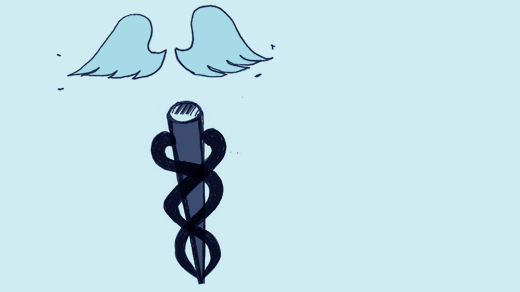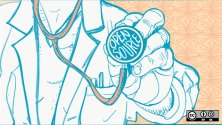Last week a friend of mine posted on Facebook, “I need a new lawnmower. Any opinions on what I should get?”
She received several responses. One person suggested a goat. Another posted a picture of an attractive shirtless man with bulging muscles gleaming with sweat as he worked in the yard. But others identified the pros and cons of various lawnmower brands for her. Based on those comments and reviews, she went with a Fiskar's momentum reel mower because it "won't need to be repaired."
Social media and online review sites where people are sharing their experiences are becoming an increasingly important catalyst to retail commerce. And websites like Angie's List even provide reviews on services—roofers, plumbers, house cleaners, etc., which I find extraordinarily valuable because I've had more than my fair share of bad plumbers and incompetent handymen.
Now more people are even turning to these review sites and social media communities to find a doctor.
But several doctors have started to require their patients to sign a "mutual agreement to maintain privacy," which forbids them to comment about the quality of service they received from that physician—good or bad. Even worse, doctors might be hiding this waiver in a handful of papers that patients fill out.
According to an Angie’s List poll, 88% of respondents were not aware that some doctors are requiring patients to sign waivers agreeing that they will not talk about their experience with their physician.
In protest, another rating site, RateMDs.com, is posting the names of physicians who require waivers on its "Wall of Shame."
But Medical Justice, an organization aimed to protect physicians from frivolous lawsuits, explains that it’s about a doctor’s career. "Doctors are at the risk of having their reputations destroyed," Dr. Jeffrey Segal said. "It takes a lifetime to build a reputation; it takes a minute and a mouse click to lose it." Medical Justice says these "Mutual agreements do not create a choice between healthcare and one's right to free speech (as some have erroneously claimed). There are existing processes and viable venues where patients can report bad experiences with physicians."
But, as BNET points out, negative feedback, if responded to correctly, "gives companies the opportunity to improve, often leading to online praise once changes are made." They talk about how Livio developers see a negative review as a chance to fix that something, then go back to the reviewer to thank them while letting them know they've addressed the issue.
Doctors are mostly keeping silent on this issue. But one doctor, WFAA interviewed explained, when it comes to online review sites, physicians can't respond to what is posted about them and so have no ability to refute negative information posted by patients. "Whether anonymous or not, doctors can't respond to specific complaints because of patient privacy laws."
Patient privacy laws can be complicated. But people have a right to talk about their experiences. Given that, should doctors be more transparent with patient reviews? Should they be allowed to prevent communities from reviewing them online?

Opensource.com
What to read next





2 Comments